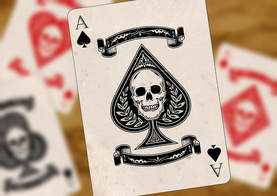by Alison LykeHappy Winter Solstice! It's the last one of the decade. In honor of the day, I wrote a fantasy, flash-fiction story. So, cuddle up by the fire and enjoy! Abrin was born on the last second of the last day of the millennium. He was an ending and a beginning wrapped up in one person. Someone born at such an extraordinary moment could be a natural sorcerer with new kinds of powers learned and studied throughout his lifetime. Or, he might be an abomination too deviant to be allowed to live in this world. Abrin had been alive for nearly two decades without performing magic, and it looked like the latter was the case. On his twentieth birthday, the guardians of magic came to collect their due. Since he was an infant, the wizards had visited him on the last day of the year. They’d ask him endless questions: Do you have strange dreams? Do you smell things that aren’t there? Have you ever wished something into existence? The only thing young Abrin wished was that the wizards with their bright robes and probing wands would leave him alone, which never did come true. As an adult, Abrin was only interviewed by bureaucrat wizards who wore smart suits instead of spangly robes. They didn’t ask him a lot of questions, just “Have you performed any magic you could reproduce for me?” In the last three years, he’d seen the same wizard on his birthdays, a bespectacled stodgy fellow ironically named Angmar the Radiant. “If you don’t have anything to show me next time,” Angmar said matter-of-factly on his last visit, “you know, that’s it for you.” Abrin resented the wizards and their predetermined ideas of who he should become. He preferred to lay around his family’s farm doing odd jobs and fishing in the stream that ran the length of the property. His mother and father had long given up on him becoming anything but a sacrifice to incomprehensible wizard gods. As the sun set on the last day of the year, Angmar knocked on Abrin’s kitchen door. The sound was muted by the flurry of falling snow blanketing the countryside. The wooden door sprung open to reveal Angmar, and a contingent of tough-looking wizards come to cart Abrin away. “Who opened the door?” Angmarthe Radiant asked when he spotted Abrin, seated in front of the hearth on the far side of the farm kitchen. “I did,” Abrin said. As he rose from the stool, all the objects in the kitchen lifted three feet above the ground. The table, stools, ice-chest, and even the dog bed, complete with its resident hound all began to float. Angmar and his goonish wizards were elevated as well. Abrin made a dismissive wave with his hands, and the men flew back out of the door and landed roughly on the snowy ground outside. “I guess that’s it for me,” Abrin added as his kitchen door slammed and locked without him lifting a finger. Remember, it only gets brighter from here!
2 Comments
Sometimes...he’d stand on the hill across the street, staring at my front door for hours, waiting for my son to get back.  by Alison Lyke As relieved as I was to move from an urban area into the suburbs, I was concerned that my son had lost his neighborhood friends. Single childhood is precarious and lonely, even for the well adjusted. There were new friends to be had in our little condo community, but our son didn’t really take a shine to anyone until the new next-door neighbors moved in, about a month after us. There were two moms and a baby girl, it seemed, I didn’t notice the little boy until our son encountered him on a bike ride. “He lives right next store. Isn’t that cool!” my son said. Perfect. I was glad to solve the mystery of why a couple and baby needed such a large condo. The two boys spent many hours running around the complex, lost in a haze of semi-unsupervised boyhood adventure. Then, his new playmate started coming around a lot more, but he never came inside. The kid had a knack for ringing the doorbell just as I was the most busy. When I opened the door, he always asked, “Is he there?” Often, he was not. My son participated in several afterschool activities and he did have other friends in other neighborhoods. Sometimes, the little boy would say, “I’ll wait until he’s home.” Then he’d stand on the hill across the street, staring at my front door for hours, waiting for my son to get back. I thought I might just not answer the doorbell when my son wasn’t in, which turned into a huge issue. The boy would ring the doorbell relentlessly until I answered. I thought, maybe I should talk to his moms, but they didn’t seem to be home very much. The boy was often alone in the afternoons before they came home from work. One morning, on the way to an early meeting, I drove past the bus stop and noticed that my son’s playmate wasn’t there with the other children. “Is your friend sick?” I asked later that afternoon, hoping for a few days respite from the doorbell. “He’s never at school. I think he’s homeschooled.” I mentally rolled my eyes. That explains why he’s so lonely. A few nights later, I was startled awake by the boy’s ring. It was around one a.m. “Is he there?” the boy asked when I swung open the door. I sent him on his way, making sure I saw him go into his own house. I resolved to talk to his parents as soon as I could. The next morning, he was standing on the hill, watching my son as he left for school. Around noon, I started out to speak with his parents, but they were loading up a moving truck. Well, that takes care of that. The poor kid was just having anxiety about moving, and missing his friend. But, why live someplace only five months? Why pack up and move so often, and with the little baby girl in tow? “I’m sorry your friend moved,” I told my son that evening. “Yeah,” he shrugged, “I guess.” Several days later, the doorbell rang. I knew that insistent ring, it wouldn’t be anyone else. “Is he there?” His playmate asked. I nodded yes and watched as my son ran off to play with the boy. "I thought your friend moved,” I said over our dinner last night, an unambitious, mid-week, tuna casserole. “He didn’t,” “I looked in his condo. It’s all emptied out. No furniture or curtains. I watched his moms load up their van.” I said, starting to feel nervous. “Well, he does still live there. He said has lived there for a long time, and he probably will live there forever.” My son said. I’m shaking while I type this. It’s almost one a.m. I’m not sure what I’m going to do when the doorbell rings. NYC Midnight Flash Fiction Challenge #1A special agent enlists a comedienne to covertly deliver a flash drive to a group of Tibetan monks.  In the empty club, with its stage curtains drawn, and its smell of floor polish not yet trodden to oblivion by the footfalls of three hundred patrons, Victoria sat at one of the clean, white, linen-covered tables with her arms folded across her chest, perhaps to keep her heart from beating right out of her rib cage. A man strode across the floor and sat opposite Victoria. He had an unkept beard, jeans with tears in the knees, and he wore a denim jacket over faded tee-shirt that said Party Time. “Victoria Robin? I’m Special Agent Brian Dicus,” he said but did not extend his hand. “Excellent,” Victoria said. Her voice shaking, she tried to crack a crooked smile. “What?” Brian asked. “You know, ‘Party time, excellent,” Victoria pointed to his shirt. “I’m undercover,” he explained as he removed a pack of playing cards from his jacket pocket. He pulled out a card and slid it over the table with two fingers. Victoria picked up the card and studied it. It looked like the ace of spades, but instead of a spade, there was a dark green cobra head at the center of the card. “Ace of snakes,” Victoria said. “It’s a flash drive packed with sensitive information,” he said. Victoria held the card up to the light and saw the glint of the computer chips in the cobra’s two eyes. “At tonight’s show there will be a contingent of three high ranking Tibetan officials,” Brian continued while Victoria inspected the flash drive, “you’ll easily recognize them because they are monks and will be dressed as such. It doesn’t matter which of the three you slip the card to, they will all be expecting it.” “And then?” “Once the drive is safely in the hands of the Tibetans, your assignment will be complete and all of the charges will not only be dropped, but erased from the records. As if it never happened.” “Perfect. Anything else?” Victoria asked. “Tell me a joke,” Brian demanded. “I’m not that kind of comedian. I tell funny stories.” “A funny story then,” Victoria paused, pulled her fire red hair back from her copper colored, almond eyes and said, “A few weeks ago I went on a blind dinner date with this guy. When we got to dessert, he kept staring at my tits; so, finally I say ‘hey buddy my eyes are up here.’ It turns out he was staring at a huge glob of ice cream that I had slobbered all over my chest,” Victoria paused for effect “Well, at least my dessert got to third base,” she finished. Brian was stone faced. Victoria snatched the card pack from the table and tucked the Ace of Snakes into it. “There’s no accounting for taste,” she said.  The All Suits Comedy club usually tailored to diverse upper middle class customers and those aspiring to be upper middle class with an over-budget night out. The patrons were moderately well dressed, rowdy, and relaxed by the club’s expensive spirits and light fare. During Victoria’s set she noticed the Tibetan contingent tucked into a the back corner of the club, wearing orange and white robes, their heads shaved and their table bare, aside from a pitcher of water. She rushed through her comedy routine, barely noticing when the audience laughed or when a punchline fell flat. The pack of cards sat heavily in the hind pocket of her jeans and more than once she reached back and absentmindedly touched it. When Victoria left the stage, Frank, a lanky fellow comedian, who wore his pet ball python around his neck like a slithery boa, stopped her in the wings and asked why she kept scratching her butt through her performance. He also had a message for her, “Some scrub friend of yours grabbed me on my way into the club and told me to give this to you,” Frank pressed a crumpled note in Victoria’s hand and took a moment to pet Bertha before they walked on stage. It read: Count the Monks Victoria waded into the crowd and counted the monks as she navigated through the tables. There were four monks instead of the three that Brian had described. Hot blood pounded into Victoria’s head, blurring her vision and beating in her ears as she tried to puzzle through the conundrum. One of them must be undercover and not a real monk, Victoria thought, and he can’t be trusted. Why else would Brian warn me? Victoria pulled an extra chair over to the monks’ table, while, on stage, Frank told his opening joke, something about how his python is even bigger than Bertha. “Hello gentlemen,” Victoria said and each of the monks nodded to her in turn. “I love monks, you know,” Victoria said, “but they don’t love me. I sometimes bartend and I meet all types. Three monks once walked into my bar and ordered martinis. I said, ‘hey fellas, how’d you like your martinis served’ and one monk answered, ‘in silence.” When she finished speaking, Victoria leaned in and closely studied the faces of the monks. Not finding what she was looking for, she leaned back and tried again, “I’ve heard that monks are so spiritually in tune that they can go an incredibly long time without eating. One famous monk set out to learn how to fast for months at a time, but he died in the process. At his funeral, his master said it was such a shame that he died just when he had learned how to not eat.” This time all of the monks laughed except the one on the far left. He remained stone faced. Victoria pulled the card deck from her pocket, removed the Ace of Snakes and handed it to one of the laughing monks. She narrowed her eyes at the last monk on the left and said, “There’s no accounting for taste.” By Alison Lyke  New York had just turned cold for the winter, but dry, so that everything smelled like copper. “Are you really standing there?” Robert asked, reaching out to touch, but Maggie recoiled, crossing her arms. Robert’s fingers just brushed the edge of her coat. “Don’t get poetic. Of course I’m here.” “I- I dreamed of you over and over. And you always look the same.” Maggie stared at him for a long moment, his sharp features, his long brown hair pulled back and tucked under his ski cap. She might have fallen into him then, she could have taken one step forward. She stopped herself. “Jesus Christ, are you kidding me.” Maggie pulled her arms even tighter, wishing she could fold inside her own body, “I’m leaving.” She turned and her heels clicked away down the alley. He watched her auburn hair flutter behind her. “So what? It’s been seven years Maggie. When are you going to fix me?” Maggie continued to hustle away, her head bowed against another copper scented gust. “I love you.” Robert said quietly, bitterly. She turned and rushed toward him, all fury and fingernails. She meant to claw his face, but he cowered too quickly. Instead she beat at him with her heavy, yellow sack of a purse. She meant every blow. Maggie shouted and punctuated each shout with a blow to either side of the man’s head, “Don’t say you love me! I don’t care!” “Please, please.” He begged back, “Please.” “Hey lady! Stop it over there!” A heavily scarved woman shouted from across the street. She pulled her young son to her other side, ensuring he no longer had a clear view of Maggie beating Robert with her purse. Maggie pulled back, took a deep breath and smoothed her fiery locks. “Are you going to hit me again?” Robert asked sheepishly. “No.” Maggie huffed, “Just don’t ever say you love me anymore. I’ve heard it enough.” “I haven’t seen you in two years, and it’s the same. I feel like I just saw you yesterday. I’m mean, I’m doing okay, but sometimes it gets bad. My memories of you are like drinking lemonade right after you bite your tongue.” Maggie looked at him with a mix of shock and mild pity. “What’s it like for you Maggie?” He asked her. She shook her head, “Not like that.” Robert looked at her with mounting hunger, “Please.” |
Alison Lyke
Categories
All
Archives
November 2022
|


 RSS Feed
RSS Feed
